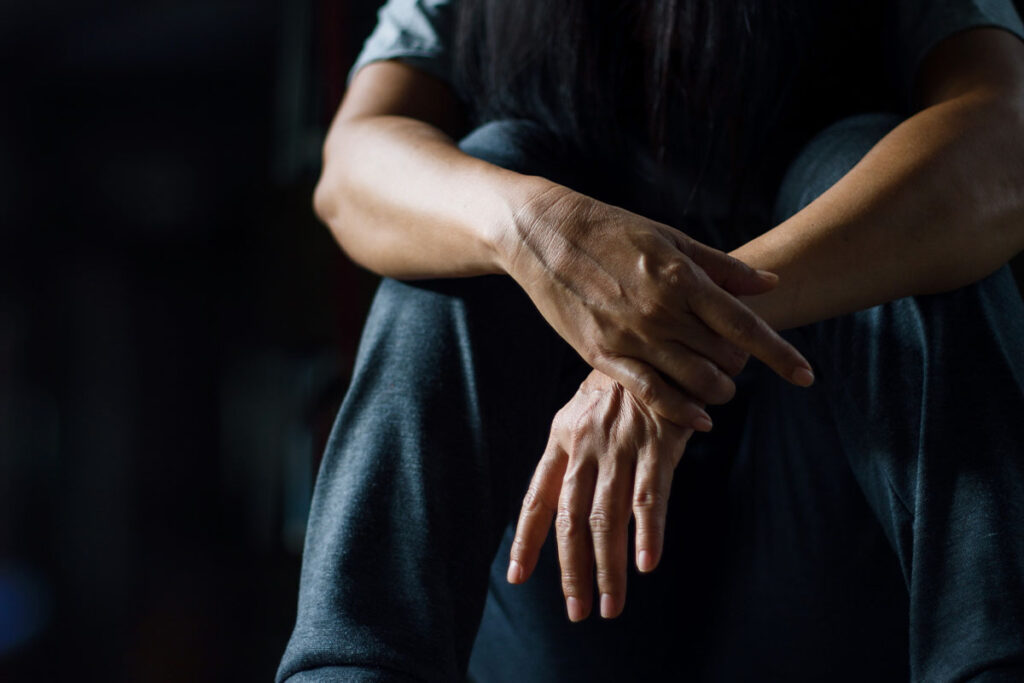Self-harm isn’t uncommon, especially among adolescents. The National Center for PTSD notes that an estimated 2-6% of people in the general public have engaged in self-harming behaviors and 13-35% of students. Rates are higher among people with mental health conditions, including post-traumatic stress disorder (PTSD). Common self-harming behaviors are cutting, scratching, piercing, hitting, pulling out hair and head banging.
People with PTSD may self-harm for different reasons. It may be an attempt to manage uncomfortable feelings by stimulating endorphins (the body’s painkilling and “feel better” chemicals). Sometimes it’s a distraction: a way to escape emotional pain by putting the focus on physical pain instead. People may self-harm to escape a feeling of numbness or consciously or unconsciously punish themselves for something they feel ashamed or guilty about.
Sometimes we know it’s illogical but still feel shame about our part in traumatic events. Because we want a sense of control over our lives, we can tell ourselves that if we’d only acted differently in a situation, we could have changed the outcome. The British Journal of Clinical Psychology published a study that found that self-criticism and shame were highly associated with self-harming behaviors.
Do you need a PTSD treatment center? Call us today at 1.844.675.1022 for more information.
Trauma and Body Experience
Experiencing any trauma at any age can contribute both to PTSD and self-harm, but Frontiers in Psychiatry notes that the link may be especially strong for people who experienced childhood maltreatment which includes physical, emotional or sexual abuse and physical or emotional neglect.
Traumatized, and especially early-traumatized people, may lack a sense of body ownership. When the boundaries between self and others aren’t clearly defined, disruption can occur in the development of bodily autonomy. People may also try to reject their bodies as a way of distancing themselves from traumatic body-related memories.
This rejection can lead to a sense of separation between mind and body and a lack of body awareness. It’s also common for people who’ve experienced trauma to develop negative attitudes about their bodies involving shame or feelings of disgust.
The European Journal of Psychotraumatology reported on a study of women in mental health treatment, which found that body attitude, body satisfaction and body awareness were all severely affected in people with early childhood trauma; this was true no matter how severe the trauma was or how frequently they experienced dissociative symptoms, which involve feeling disconnected from the body.
People with PTSD often experience intrusive memories and find that the past takes over the present. They may find themselves dissociating and needing to remember that they’re no longer living in the situation they once found themselves in. They may use self-harm as a way of getting back in touch with their bodies and the present moment.
The American Psychological Association reports that there is robust evidence that dissociation plays a role in the connection between trauma and self-harm. Treatment for PTSD involves developing healthy ways to achieve the goal of grounding and body awareness.
Treatment for Self-Harm Within PTSD
Addressing self-harming behavior involves identifying and addressing the cause. Cognitive-behavioral therapy can help you identify and address untrue and counterproductive thoughts, such as that you were somehow to blame and should feel ashamed. Therapies like dialectical behavior therapy can help you develop coping and emotional regulation skills. Specific trauma therapies can help you get more in touch with your body and become more focused on the safety of the present moment than the trauma of the past.
In some cases, medications may be used to help stabilize mood and ease symptoms of anxiety and depression. For example, antidepressants can be helpful in treating the low mood that often accompanies PTSD. However, it’s important to work with a psychiatrist who is familiar with PTSD to make sure that any medications prescribed do not make your symptoms worse.
In addition to medication, treatment for self-harm within PTSD also entails developing a support system. This can mean getting involved in therapy, attending a support group for people with PTSD, or both. Family and friends can also be an important part of your support system. If you have difficulty finding social support, there are online communities that can provide some level of interaction and connection.
If you are engaging in self-harming behavior, it’s important to get help as soon as possible. There are many treatment options available that can help you heal the underlying causes of your self-harm and live a fulfilling life.
Clearly, facing trauma is difficult. Without the right tools to manage it, it can be mentally, emotionally and physically damaging. But you are not alone, and there is help.
Professional Help is Just a Phone Call Away
At Promises Five Palms, we will support you as you begin to remove the layers of your trauma to understand yourself and your responses better. Our caring team of professionals is ready to help when you are ready to receive it. Call us today at 1.844.675.1022.

